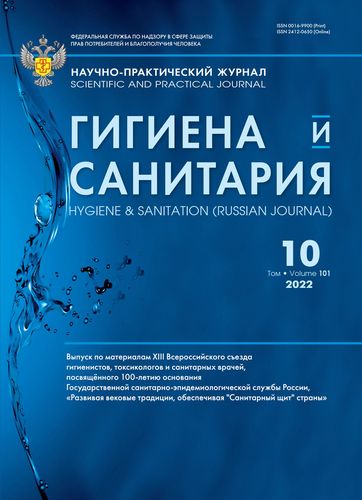Assessment of occupational a priori health risk at the workplace
- Autores: Meltser A.V.1, Yakubova I.S.1, Erastova N.V.1, Kropot A.I.1
-
Afiliações:
- North-Western State Medical University named after I.I. Mechnikov
- Edição: Volume 101, Nº 10 (2022)
- Páginas: 1195-1199
- Seção: OCCUPATIONAL HEALTH
- ##submission.datePublished##: 24.10.2022
- URL: https://hum-ecol.ru/0016-9900/article/view/638888
- DOI: https://doi.org/10.47470/0016-9900-2022-101-10-1195-1199
- ID: 638888
Citar
Texto integral
Resumo
Introduction. The results of the occupational risk assessment are additional to a special assessment of the working conditions for obtaining quantitative information on the likelihood of developing health disorders. Occupational risk models have not been approved yet, and the proposed approach allowed assessing a priori risk from various harmful factors and conditions, predicting workload, and elevating the effectiveness of preventive measures.
Materials and Methods. The assessment of a priori occupational risk from exposure to noise, chemicals and stress-related risk factors was performed at the workshop No. 1 of the oil refinery «KINEF» LLC using the proven models. The results of studies and measurement, conducted in 2020 within the special assessment of working conditions, were used as an input data.
Results. The levels of occupational risk caused by exposure to a chemical factor did not reach values significant for the development of occupational disease, regardless of service length. The levels of occupational risk from exposure to noise at individual workplaces formed a risk level significant for the development of occupational diseases with the work experience of more than 30 and 40 years. At individual workplaces, the risk associated with the work intensity is relevant for the work experience of more than 20 years. There were identified persons whose professional experience allows determining the risk levels significant for the development of occupational diseases.
Limitations. The limitations of the study are uncertainties associated with conducting a special assessment of the working conditions.
Conclusion. Occupational risk assessment makes it possible to supplement the existing approaches with a quantitative assessment of the probable damage to workers health, to identify the vulnerable groups of employees, to determine the length of service considering the exposure factors.
Compliance with ethical standards. The study was approved by the Local Ethics Committee of the North-Western State Medical University named after I.I. Mechnikov (extract from the protocol dated November 3, 2021 No. 10).
Contribution:
Meltser A.V. — the concept and design of the study, text, editing, final approval of the article;
Yakubova I.Sh. — the concept and design of the study, the choice of analytical methods, text, editing;
Erastova N.V. — literature review, data collection and processing, analysis of the results, text, editing, final approval of the article;
Kropot A.I. — literature review, database formation, statistical analysis.
All co-authors — responsibility for the integrity of all parts of the article.
Conflict of interest. The authors declare no conflict of interest.
Acknowledgement. The study had no sponsorship.
Received: September 13, 2022 / Accepted: October 3, 2022 / Published: October 23, 2022
Sobre autores
Alexander Meltser
North-Western State Medical University named after I.I. Mechnikov
Autor responsável pela correspondência
Email: noemail@neicon.ru
ORCID ID: 0000-0003-4186-457X
Rússia
Irek Yakubova
North-Western State Medical University named after I.I. Mechnikov
Email: noemail@neicon.ru
ORCID ID: 0000-0003-2437-1255
Rússia
Natalya Erastova
North-Western State Medical University named after I.I. Mechnikov
Email: nataliya.erastova@szgmu.ru
ORCID ID: 0000-0003-4062-9578
MD, PhD, Associate Professor of the Department of Preventive Medicine and Public Health, Head of the Center for Analytical and Methodological Support for the Development of Regional Health Care and Preventive Medicine, North-Western State Medical University named after I.I. Mechnikov, Saint-Petersburg, 195067, Russian Federation.
e-mail: Nataliya.Erastova@szgmu.ru
RússiaAnna Kropot
North-Western State Medical University named after I.I. Mechnikov
Email: noemail@neicon.ru
ORCID ID: 0000-0002-6040-9161
Rússia
Bibliografia
- Alyanin R.F., Gallyamov M.A., Abdrakhmanov E.N. Industrial noise. Problems and solutions. Elektronnyy nauchnyy zhurnal Neftegazovoe delo. 2019; (2): 128–42. https://doi.org/10.17122/ogbus-2019-2-128-142 (in Russian)
- Mel’tser A.V., Erastova N.V., Kiselev A.V., Kropot A.I. А priori occupational health risk of oil refining workers from noise production impact. Profilakticheskaya i klinicheskaya meditsina. 2021; (1): 12–9. https://doi.org/10.47843/2074-9120_2021_1_12.eng (in Russian)
- Koshurnikov D.N., Maksimova E.V. Review of domestic methods for assessing the individual noise dose. In: Popova A.Yu., Zaytseva N.V., eds. Fundamental and Applied Aspects of Population Health Risk: Materials of the All-Russian Scientific and Practical International On-Line Conference of Young Scientists and Rospotrebnadzor Specialists [Fundamental’nye i prikladnye aspekty analiza riska zdorov’yu naseleniya: materialy Vserossiyskoy nauchno-prakticheskoy internet-konferentsii molodykh uchenykh i spetsialistov Rospotrebnadzora s mezhdunarodnym uchastiem]. Perm’; 2018: 340–4. (in Russian)
- Kurenkova G.V., Sudeykina N.A., Lemeshevskaya E.P. Methodical aspects of hygienic assessment of occupational risk to health workers. Sibirskiy meditsinskiy zhurnal (Irkutsk). 2015; 138(7): 46–52. (in Russian)
- Mel’tser A.V., Erastova N.V., Kiselev A.V. Hygienic justification of quantitative assessment models of a priori occupational health risk. Profilakticheskaya i klinicheskaya meditsina. 2020; (3): 12–20. (in Russian)
- Setko N.P., Movergoz S.V., Bulycheva E.V. Analysis of individual occupational health risks for workers with basic occupations typical for oil processing enterprises. Analiz riska zdorov’yu. 2020; (3): 132–8. https://doi.org/10.21668/health.risk/2020.3.16 (in Russian)
- Bukhtiyarov I.V., Kuzmina L.P., Izmerova N.I., Golovkova N.P., Nepershina O.P. Improvement of mechanisms of detecting early signs of health disorders for preservation labor longevity. Meditsina truda i promyshlennaya ekologiya. 2022; 62(6): 377–87. https://doi.org/10.31089/1026-9428-2022-62-6-377-387 (in Russian)
- Shur P.Z., Shlyapnikov D.M., Alekseev V.B. On the issue of assessing occupational health risk of workers. In: Environmental Problems of Our Time: Identification and Prevention of the Adverse Impact of Anthropogenic Deterministic Factors and Climate Change on the Environment and Public Health. Materials of the International Forum of the Scientific Council of the Russian Federation [Ekologicheskie problemy sovremennosti: vyyavlenie i preduprezhdenie neblagopriyatnogo vozdeystviya antropogenno determinirovannykh faktorov i klimaticheskikh izmeneniy na okruzhayushchuyu sredu i zdorov’e naseleniya. Materialy Mezhdunarodnogo Foruma Nauchnogo soveta Rossiyskoy Federatsii]. Moscow; 2017: 570–1. (in Russian)
Arquivos suplementares








